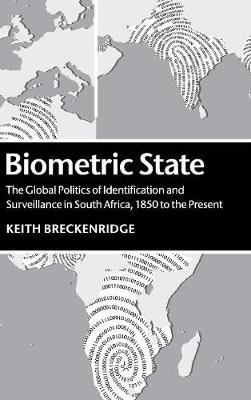
Biometric State
Cambridge University Press (Verlag)
978-1-107-07784-3 (ISBN)
Biometric identification and registration systems are being proposed by governments and businesses across the world. Surprisingly they are under most rapid, and systematic, development in countries in Africa and Asia. In this groundbreaking book, Keith Breckenridge traces how the origins of the systems being developed in places like India, Mexico, Nigeria and Ghana can be found in a century-long history of biometric government in South Africa, with the South African experience of centralized fingerprint identification unparalleled in its chronological depth and demographic scope. He shows how empire, and particularly the triangular relationship between India, the Witwatersrand and Britain, established the special South African obsession with biometric government, and shaped the international politics that developed around it for the length of the twentieth century. He also examines the political effects of biometric registration systems, revealing their consequences for the basic workings of the institutions of democracy and authoritarianism.
Keith Breckenridge is an historian and the deputy director of the Wits Institute for Social and Economic Research at the University of the Witwatersrand, Johannesburg. He has published widely on the cultural and economic history of South Africa, particularly the gold mining industry, the state and the development of information systems. His writing on biometrics has appeared in Africa, History Workshop, the Journal of Southern African Studies, Public Culture and some of the most influential comparative anthologies on systems of identification. In 2012 he co-edited Registration and Recognition: Documenting the Person in World History, with Simon Szreter, a volume of essays for the British Academy examining the workings and failures of civil registration in twenty different regions and periods around the world.
Introduction: the global biometric arena; 1. Science of empire: the South African origins and objects of Galtonian eugenics; 2. Asiatic despotism: Edward Henry on the Witwatersrand; 3. Gandhi's biometric entanglement: fingerprints, Satyagraha and the global politics of Hind Swaraj; 4. No will to know: biometric registration and the limited curiosity of the gatekeeper state; 5. Verwoerd's bureau of proof: the Apartheid Bewysburo and the end of documentary government; 6. Galtonian reversal: apartheid and the making of biometric citizenship; Epilogue: empire and the mimetic fantasy; Conclusion; Bibliography; Index.
| Erscheint lt. Verlag | 2.10.2014 |
|---|---|
| Zusatzinfo | 1 Maps; 3 Halftones, black and white |
| Verlagsort | Cambridge |
| Sprache | englisch |
| Maße | 157 x 235 mm |
| Gewicht | 510 g |
| Themenwelt | Geisteswissenschaften ► Geschichte ► Allgemeine Geschichte |
| Geisteswissenschaften ► Geschichte ► Regional- / Ländergeschichte | |
| Geschichte ► Teilgebiete der Geschichte ► Technikgeschichte | |
| Naturwissenschaften | |
| Sozialwissenschaften ► Politik / Verwaltung | |
| ISBN-10 | 1-107-07784-2 / 1107077842 |
| ISBN-13 | 978-1-107-07784-3 / 9781107077843 |
| Zustand | Neuware |
| Haben Sie eine Frage zum Produkt? |
aus dem Bereich


